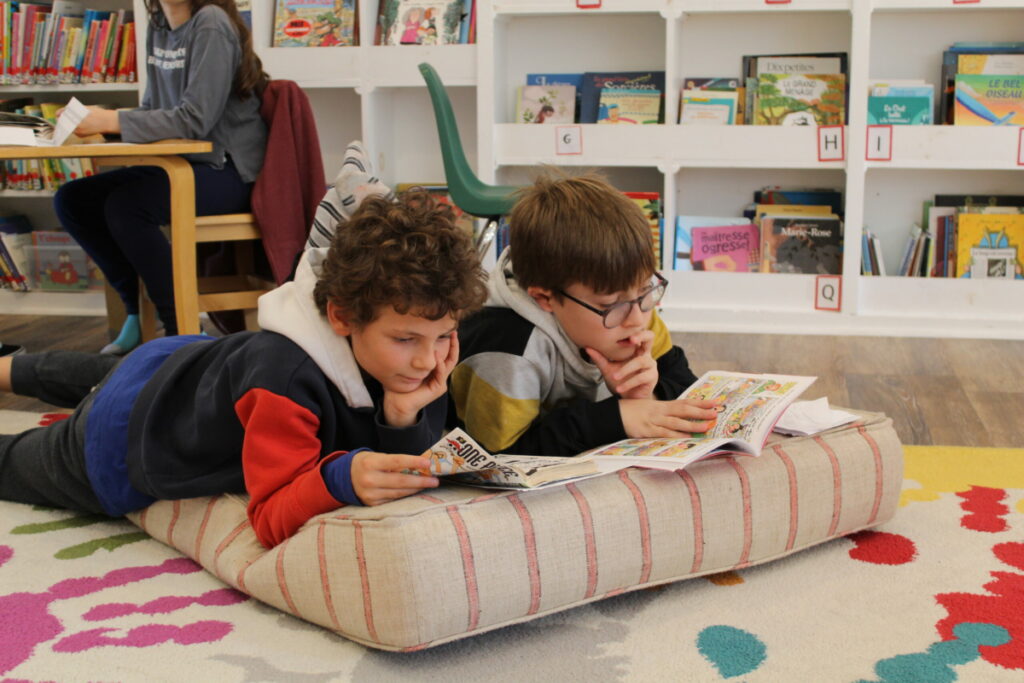For students entering second grade and up, the French American Academy teachers assign summer reading tasks, activities, and challenges to ensure that students retain their reading stamina and skills. We do this because it’s very helpful for preventing the dreaded “summer slide” (more on that here), and because it’s useful for students to return to school with a shared understanding of academic texts, so that the class can dive into learning and discussions much more quickly.
For some golden children, parental reminders will not be necessary, as these youngsters will enthusiastically plunge into their summer assignments with fervor and delight. How nice! But … the rest of us know that our children will need some form of support or incentive to tackle summer reading, so let’s look at a few tips for supporting and motivating our kids to get it done.
Table of contents
1. Limit screen time on phones and tablets.
This one is crucial, for so many reasons. We know that the reading won’t get done if a child is playing on a device instead, eating up the hours until they’re too dazed to focus on a book. Scrolling or playing on a device also gives children’s brains little hits of meaningless entertainment that last less than a minute, and/or mini rewards for doing mindless tasks like smashing piggies or crushing candy. The quick timing and addictive nature of these activities rewires humans’ brains, making it exponentially harder to focus on reading tasks while also dulling receptivity and perception in real life. Device usage has a damaging impact on sleep, which will also affect motivation and stamina, and can cause eye strain, which will make it more difficult for children to read books. We could go on and on with reasons that screen time is detrimental to children’s physical health, education, and brain development.
Summer time should not mean unlimited screen time. Please help your child out by restricting their access and by curating the types of applications that they’re allowed to enjoy.
2. Make a daily schedule.
At the beginning of the summer, take a look at the reading tasks with your child, and figure out how much work is reasonable for each day. Summer assignments will never be so cumbersome that children need to spend hours working on them. Grab a calendar or agenda, and work with your child to set a daily schedule, incorporating breaks on the weekend or for family vacations as you and your child see fit. Once they see how easily they can accomplish their tasks by chipping away at them bit by bit, they may find the work to be less overwhelming.
3. Create a space for reading.
Your child might be more motivated to do their reading if there is a designated quiet area for it. Communicate with them to see what type of environment would suit them and eliminate distractions. In school, teachers may provide noise-canceling headphones for kids who are distracted by sound; that might be a useful addition to the reading area. Some children like the special feeling of reading in their parents’ bedroom, which can be quieter and has no toys to pull focus away. Experiment with creating that space for and with your child.
4. Make it a family activity.
The advice we’ve listed here could apply to adults as well. Why not create your own summer reading list, and tackle it bit by bit along with your child? Scheduled family reading time will model good reading habits for children and help them feel supported and less isolated while doing their assignments. After the designated family reading time, take a few minutes to discuss your respective books, perhaps highlighting what each of you have learned or your analysis of your texts. Of course, no phones or tablets should be in the room during family reading time.
Children are not born with good reading habits automatically instilled in their brains. As they witness you putting aside other tasks and distractions and getting absorbed in a book, they will emulate this and build up their own stamina and thirst for reading. An added bonus: you will also benefit from slowing down and taking in a good book, perhaps rediscovering the joy of reading for yourself!
5. Make it fun.
You can gamify summer reading in a variety of ways, such as:
- create a series of silly challenges or rewards with your child and randomize them, so for each day they get a little task or treat to incentivize their reading.
- make bingo cards of summer reading challenges for your children and yourself, and see who crosses out the most squares the quickest.
- this free summer reading challenge printable has tasks and badges that children can collect and decorate.
6. Incorporate travel and creativity into reading.
We love bringing our creativity into reading, making the story our own.
- Try to create a “reader’s theater” after sharing a book, assigning roles and acting out the story.
- Do an art activity, drawing or painting favorite scenes and characters from the book.
- Challenge your child to tell or write a new ending for the book, or a prequel or sequel.
- Analyze the main character’s personality traits, and imagine how the story would change if the character were wacky instead of serious, lazy instead of active, irresponsible instead of responsible.
You can also take reading challenges out on the road, or at least out of the living room. Perhaps you can make a reading map with your child, challenging them to read in a set number of different places in your house, neighborhood, or town. Your family could also visit the library regularly to enjoy programs, discover new books, and have a quiet place to read.
A season of learning.
Summer vacation is an essential time for children to rest, explore the outdoors, see the world, and connect with friends and family that they don’t usually get to spend time with. It’s also an opportunity for them to learn independent study habits with your guidance. Supporting your child’s summer reading helps them remain intellectually engaged, and better prepares them for the upcoming school year.







